
In the political history of Britain, placemen were Members of Parliament who held paid office in the civil service, generally sinecures, simultaneously with their seat in the legislature.

In the political history of Britain, placemen were Members of Parliament who held paid office in the civil service, generally sinecures, simultaneously with their seat in the legislature.
Placemen exerted substantial influence over legislation during the reign of William III and Mary II, who jointly acceded to the throne following the Glorious Revolution of 1688–89. Estimates of the number of placemen in Parliament during the 1690s vary, but the consensus among contemporary chroniclers converges around 100 or so (with a few outliers among government critics such as Samuel Grascome, who put the number far higher). [1]
As of 1690, William's court adopted an explicit policy directing placemen—who, at that time, included customs officers as well as others with 'Pentions' or 'other Advantages' provided by royal largesse—to advance the Crown's interest in Parliament, particularly as regards voting supply. [2] Rubini notes that this is not surprising, as placemen 'received some of what they voted as their reward'. [3]
A 1692 bill, which failed to pass, would have shortened the length of parliaments and banned officeholders from serving in Parliament. John Granville, apparently recalling the Self-denying Ordinance of 1645, called it a 'self-denying bill' in debate. [4] [5]
An anonymous pamphleteer writing in 1698 about the selection of a speaker expresses exasperation with the 'well paid Forces' of the Crown as compared to the 'undisciplin'd Militia' of the country party:
'Tis true, the ablest General alone, and without Troops, is insignificant: But when regulated and well paid Forces have a bold and skilful Leader at their Head, they must conquer; especially if those they encounter be an undisciplin'd Militia just brought out of their several Counties. [6] [7]
In many cases, placemen under William III exercised their control over Parliament simply by showing up: attendance at legislative sessions during William's reign was generally low, so a bloc determined to vote could pass its favoured measures by default. [7]
A provision included in a draft version of the Act of Settlement 1701 would have banned all placemen from serving in Parliament, but the language was ultimately omitted. [8]

William III, also widely known as William of Orange, was the sovereign Prince of Orange from birth, Stadtholder of Holland, Zeeland, Utrecht, Guelders, and Overijssel in the Dutch Republic from the 1670s, and King of England, Ireland, and Scotland from 1689 until his death in 1702. As King of Scotland, he is known as William II. He is sometimes informally known as "King Billy" in Ireland and Scotland. His victory at the Battle of the Boyne in 1690 is commemorated by Unionists, who display orange colours in his honour. He ruled Britain alongside his wife and cousin, Queen Mary II, and popular histories usually refer to their reign as that of "William and Mary".
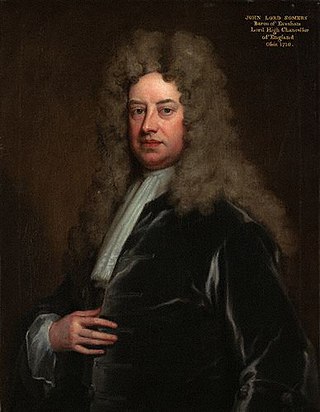
John Somers, 1st Baron Somers, was an English Whig jurist and statesman. Somers first came to national attention in the trial of the Seven Bishops where he was on their defence counsel. He published tracts on political topics such as the succession to the crown, where he elaborated his Whig principles in support of the Exclusionists. He played a leading part in shaping the Revolution settlement. He was Lord High Chancellor of England under King William III and was a chief architect of the union between England and Scotland achieved in 1707 and the Protestant succession achieved in 1714. He was a leading Whig during the twenty-five years after 1688; with four colleagues he formed the Whig Junto.

Robert Harley, 1st Earl of Oxford and Earl Mortimer, KG PC FRS was an English statesman and peer of the late Stuart and early Georgian periods. He began his career as a Whig, before defecting to a new Tory ministry. He was raised to the peerage of Great Britain as an earl in 1711. Between 1711 and 1714 he served as Lord High Treasurer, effectively Queen Anne's chief minister. He has been called a prime minister, although it is generally accepted that the de facto first minister to be a prime minister was Robert Walpole in 1721.

Andrew Fletcher of Saltoun was a Scottish writer and politician, remembered as an advocate for the non-incorporation of Scotland, and an opponent of the 1707 Act of Union between Scotland and England. Fletcher became an exile in 1683 after being accused of promoting insurrection. He was appointed the cavalry commander of the Monmouth Rebellion, but shortly after landing in England he killed another leading figure. He again went into exile, this time as a fugitive and with his estates forfeit. He returned with William of Orange, becoming Commissioner of the old Parliament of Scotland.
The Protestant Ascendancy, known simply as the Ascendancy, was the political, economic, and social domination of Ireland between the 17th century and the early 20th century by a minority of landowners, Protestant clergy, and members of the professions, all members of the Established Church. The Ascendancy excluded other groups from politics and the elite, most numerous among them Roman Catholics but also members of the Presbyterian and other Protestant denominations, along with non-Christians such as Jews, until the Reform Acts (1832–1928).
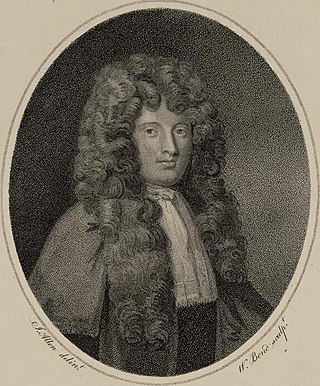
Sir William Williams, 1st Baronet was a Welsh lawyer and politician. He served as a Member of Parliament for Chester and later Beaumaris, and was appointed Speaker for two English Parliaments during the reign of Charles II. He later served as Solicitor General during the reign of James II. Williams had a bitter personal and professional rivalry with Judge Jeffreys.

Lieutenant-General Francis Nicholson was a British Army general and colonial official who served as the Governor of South Carolina from 1721 to 1725. He previously was the Governor of Nova Scotia from 1712 to 1715, the Governor of Virginia from 1698 to 1705, the Governor of Maryland from 1694 to 1698, the Lieutenant Governor of Virginia from 1690 to 1692, and the Lieutenant Governor of the Dominion of New England from 1688 to 1689.
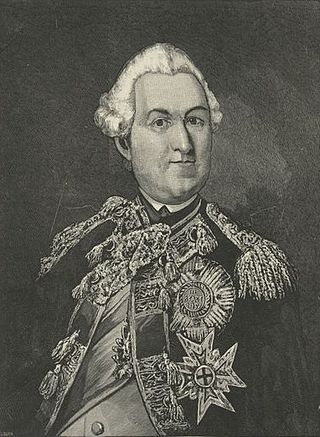
Richard Coote, 1st Earl of Bellomont, known as The Lord Coote between 1683–89, was an Irish nobleman and colonial administrator who represented Droitwich in the English Parliament from 1688 to 1695. He was a prominent Williamite, supporting William III and Mary II during the Glorious Revolution.
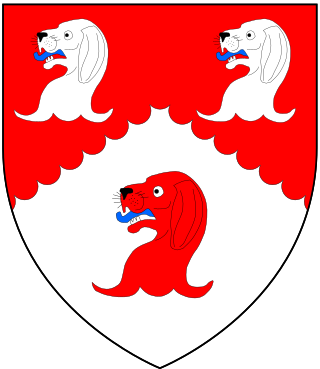
Sir Charles Duncombe of Teddington, Middlesex and Barford, Wiltshire, was an English banker and Tory politician who sat in the English and British House of Commons between 1685 and 1711. He served as Lord Mayor of London from 1708 to 1709. He made a fortune in banking and was said to be worth £400,000 later in life, and the richest commoner in England on his death.

William Bromley of Baginton, Warwickshire, was an English Tory politician who sat in the English and British House of Commons between 1690 and 1732. He was Speaker of the House of Commons of Great Britain from 1710 to 1713 and Secretary of State for the Northern Department from 1713 to 1714.
Henry Bertie, JP, of Chesterton, Oxfordshire was an English soldier and Tory politician who sat in the English and British House of Commons between 1678 and 1715.
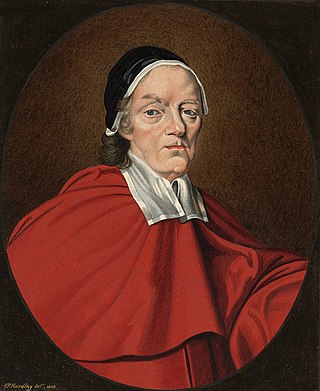
Sir John Maynard KS was an English lawyer and politician, prominent under the reigns of Charles I, the Commonwealth, Charles II, James II and William III.
Sir William Ashhurst or Ashurst was an English banker and Whig politician who sat in the English and British House of Commons between 1689 and 1710. He served as Lord Mayor of London for the year 1693 to 1694.
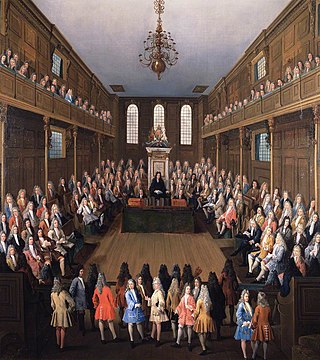
The House of Commons of England was the lower house of the Parliament of England from its development in the 14th century to the union of England and Scotland in 1707, when it was replaced by the House of Commons of Great Britain after the 1707 Act of Union was passed in both the English and Scottish parliaments at the time. In 1801, with the union of Great Britain and Ireland, that house was in turn replaced by the House of Commons of the United Kingdom.

The English Convention was an assembly of the Parliament of England which met between 22 January and 12 February 1689 and transferred the crowns of England and Ireland from James II to William III and Mary II.
Sir Thomas Meres, of Lincoln and Bloomsbury, Middlesex, was an English lawyer and Tory politician who sat in the English and British House of Commons between 1659 and 1710. He showed a remarkable level of activity both within and outside Parliament, particularly during the reign of Charles II.

Sir Edward Phelips Jr. esq of Montacute was an English landowner and politician who sat in the House of Commons at various times between 1661 and 1699.

The Irish Army or Irish establishment, in practice called the monarch's "army in Ireland" or "army of Ireland", was the standing army of the Kingdom of Ireland, a client state of England and subsequently of Great Britain. It existed from the early 1660s until merged into the British Army in 1801, and for much of the period was the largest force available to the British monarchy, being substantially larger than the English and Scottish establishments.
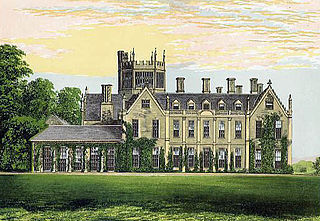
Thomas Strangways (1643–1713) of Melbury House in Melbury Sampford near Evershot, Dorset was an English landowner and Tory politician who sat in the English and British House of Commons between 1673 and 1713. As a militia colonel he was active in opposing the Monmouth rebellion. For his last nine years in Parliament, he was the longest sitting member of the House of Commons.
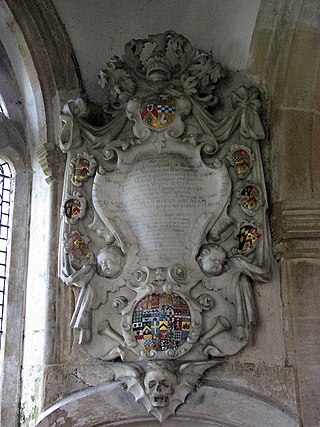
Sir William Cook, 2nd Baronet, of Broome Hall in Norfolk, was a member of the East Anglian gentry and a Tory Member of Parliament.